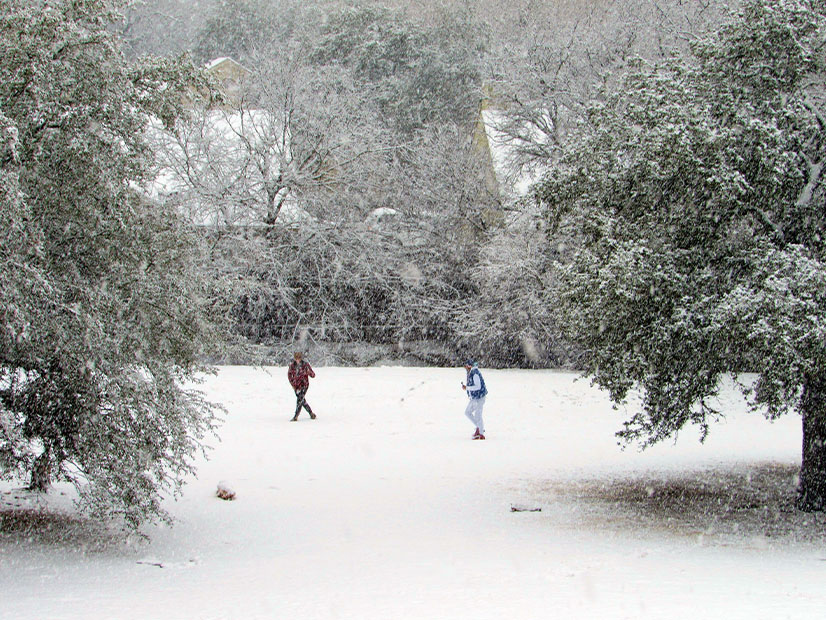
Citing “glaring exceptions and vague requirements” with the proposed cold weather standards submitted by NERC last month, members of the ISO/RTO Council on March 21 expressed “united opposition” to their approval and urged FERC to direct the ERO to submit a revision addressing RTOs’ and ISOs’ concerns within the next four months (RD24-5).
NERC filed EOP-012-2 (Extreme cold weather preparedness and operations) with the commission Feb. 16, the day after the organization’s Board of Trustees approved the standard at its open meeting in Houston. (See “Cold Weather Standard Accepted,” NERC Board of Trustees/MRC Briefs: Feb. 14-15, 2024.) It serves as successor to EOP-012-1, which FERC approved in February 2023 while ordering NERC to develop a replacement within a year.
In its filing, the IRC emphasized that it supports the commission and the ERO’s efforts to prevent future major outages due to cold weather, such as those during winter storms Elliott and Uri, through the development of reliability standards. The council said it “has actively engaged” during all stages of the standards development process “to advocate for durable requirements that will lead to effective winterization” and “was careful to propose specific language to address the concerns it raised.”
However, although the IRC acknowledged the standards drafting team modified the standard in response to some of its comments, it said the submitted standards leave the “most significant concerns … unaddressed.” It warned that approving the standard will lead to more reliability issues, causing additional work for FERC and greater cost for generator owners and the public.
“It is admittedly unusual for the IRC members in the United States to unanimously urge the commission to reject and remand a NERC reliability standard,” the IRC wrote. “The IRC does not take this step lightly, but given … the need to ‘get it right’ rather than just ‘getting it done,’ the IRC urges the commission to carefully weigh the fact that the record reflects the united opposition of all the RTOs and ISOs throughout the [U.S.] (and the [Independent Electricity System Operator] in Canada) to the exceptions and low winterization bar included in the proposed standard.”
Cost Concerns Misplaced, IRC Says
The IRC listed multiple issues with the standard, but a common theme was that NERC’s proposed requirements were “subjective [and] unclear.”
For example, Requirement R7 of EOP-012-2 excuses generator owners from implementing freeze protection measures if those measures would cause a “generator cold weather constraint” — meaning that the measures cannot be “implemented at a reasonable cost consistent with good business practices, reliability or safety.” Unreasonable costs include “prohibitively expensive modifications or significant expenditures on equipment with minimal remaining life.”
The IRC said this definition gives GOs multiple avenues to avoid implementing freeze protection measures, and forces NERC and the regional entities to judge the reasonableness and accuracy of an entity’s estimated costs. Pointing out that this is not normally the ERO’s jurisdiction, the IRC said the commission should direct cost-based constraints to be removed from the standard. Instead, IRC suggested constraints should be granted on a per-unit basis on grounds of technical feasibility, which the IRC observed falls under NERC’s expertise.
In addition, the IRC warned the standard “provides far too much discretion to [registered entities] to interpret whether freeze protection measures are available for [their] equipment when determining whether a basis exists to declare a constraint.” It noted that the standard’s definition of “freeze protection measures” refers to practices and technologies “generally implemented by the electric industry in areas that experience similar winter climate conditions.”
The council expressed concern this language would create difficulties with auditing the standard, because GOs could simply declare a constraint on the grounds that there are no available measures that are “generally implemented” by their peers. This could also “delay and disincentivize” the adoption of new technologies. IRC’s filing said the ERO should be directed to require measures that “would reasonably be expected to result in effective facility performance while operating at the extreme cold weather temperature.”
Exemptions Too Generous
IRC also took issue with the standard’s exemptions for existing generating units. The standard exempts units from some winterization requirements if they “may be called upon to … assist in the mitigation of … emergencies during periods at or below a temperature of 32 degrees Fahrenheit.” IRC suggested that this exemption should apply only to “truly seasonal generating units that will not be called upon to operate during freezing conditions” so that units unsuited for cold weather are not called on in emergencies.
NERC’s proposed timelines for implementing corrective action plans on units that experience cold weather-related emergencies — with entities’ required actions that can be completed within 24 and 48 months — were also a subject of the IRC’s criticism, with the council worrying that these periods “do not appropriately reflect the urgency of winterizing generating units.” It supported reducing the timetables to 12 and 24 months, along with requiring GOs to receive approval from NERC or their REs for longer implementation timelines.
In a statement, NERC said that EOP-012-2 is part of a “suite of cold weather standards [that] are key to addressing” grid impacts of severe cold weather. The ERO pointed to EOP-012-2’s clarifications of applicability, GOs’ eligibility for exemptions and shortening the implementation timeline as “key modifications that build on the general framework and principles established in EOP-012-1,” and said NERC is committed “to monitoring the effectiveness of the standard.”



